
Uncanny Valley By Rimini Protokoll (Stefan Kaegi) Und Thomas Melle
Venue:
Theatre YOUNG
NO.1155, Kongjiang Rd Yangpu Shanghai
Date:
3/15/2025 - 3/16/2025
Choose Session:
Choose Price:

Uncanny Valley By Rimini Protokoll (Stefan Kaegi) Und Thomas Melle
3/15/2025 - 3/16/2025
Theatre YOUNG
NO.1155, Kongjiang Rd Yangpu Shanghai
¥200
Event details
👉 Exchanging paper ticket at the venue with the ticket code which you received via text message starting with【YOUNG剧场】
👉 Children under 1.2m are not allowed to enter
👉 Children over 1.2m will be admitted by full tickets
👉 No cancellation
👉 Children under 1.2m are not allowed to enter
👉 Children over 1.2m will be admitted by full tickets
👉 No cancellation
We mostly think of robots as work machines, as efficient and precise executors of tasks. In German industry, they barely look like people, to avoid emotional complications. Unlike in Asia, where humanoid robots have already been developed for some time, for example for care-work. The external similarity to human beings makes the acceptance of machines easier. However, if the machine is too similar to a human, we begin to feel mistrust: what is human, what is machine? Japanese robotics researchers call this weird similarity the “uncanny valley”.
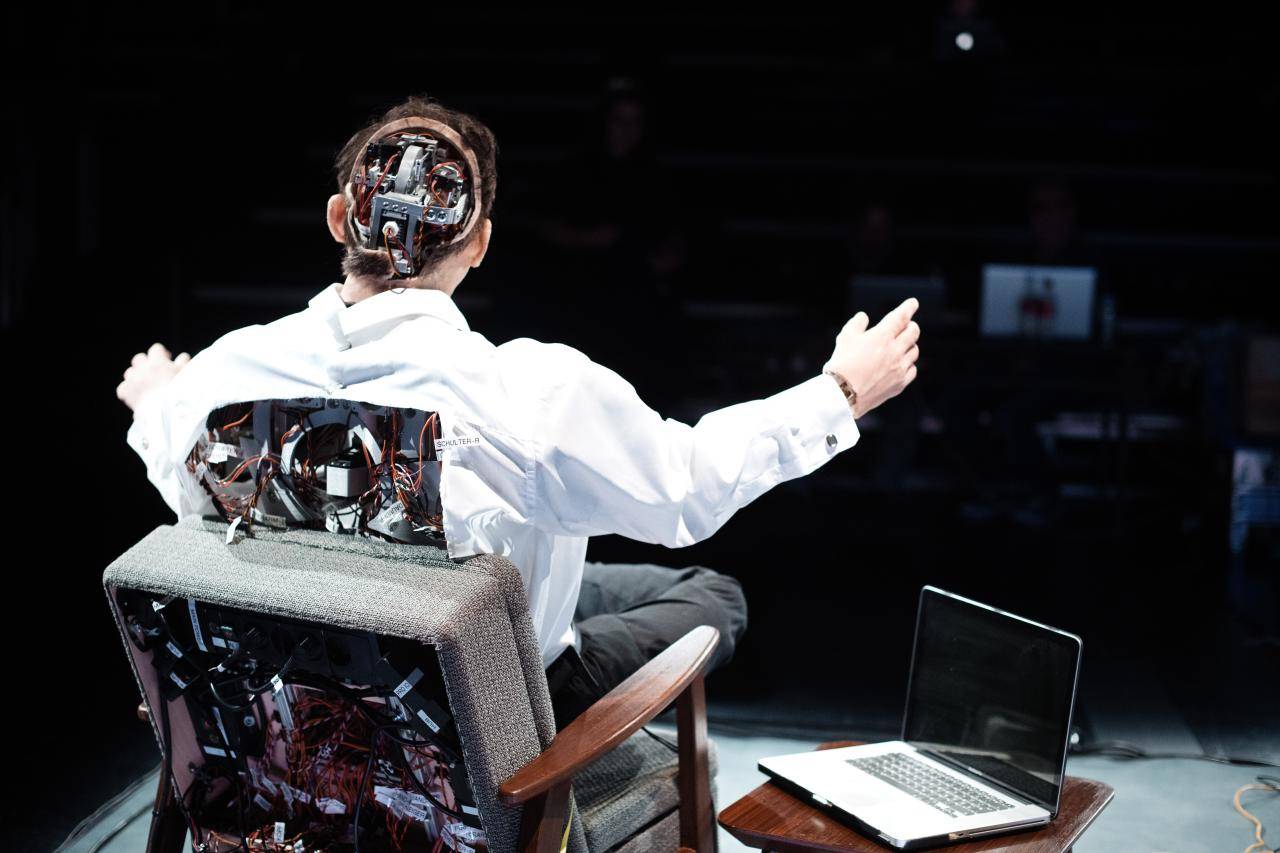
For his play, Stefan Kaegi works with a writer and playwright for the first time: Thomas Melle allowed an animatronic double of himself to be made. This humanoid takes the author’s place and throws up questions: what does it mean for the original when the copy takes over? Does the original get to know himself better through his electronic double? Do the copy and his original compete or do they help each other?

UNCANNY VALLEY
The uncanny valley hypothesis holds that when robots and other facsimiles of humans look and act almost like actual humans, it causes a response of revulsion among human observers. The "valley" in question is a dip in a proposed graph of the positivity of human reaction as a function of a robot's lifelikeness.It was introduced by Japanese roboticist Masahiro Mori in 1970, and has been linked to Ernst Jentsch's concept of "the uncanny" identified in a 1906 essay, "On the Psychology of the Uncanny". Jentsch's conception is famously elaborated upon by Sigmund Freud in a 1919 essay titled "The Uncanny" ("Das Unheimliche").
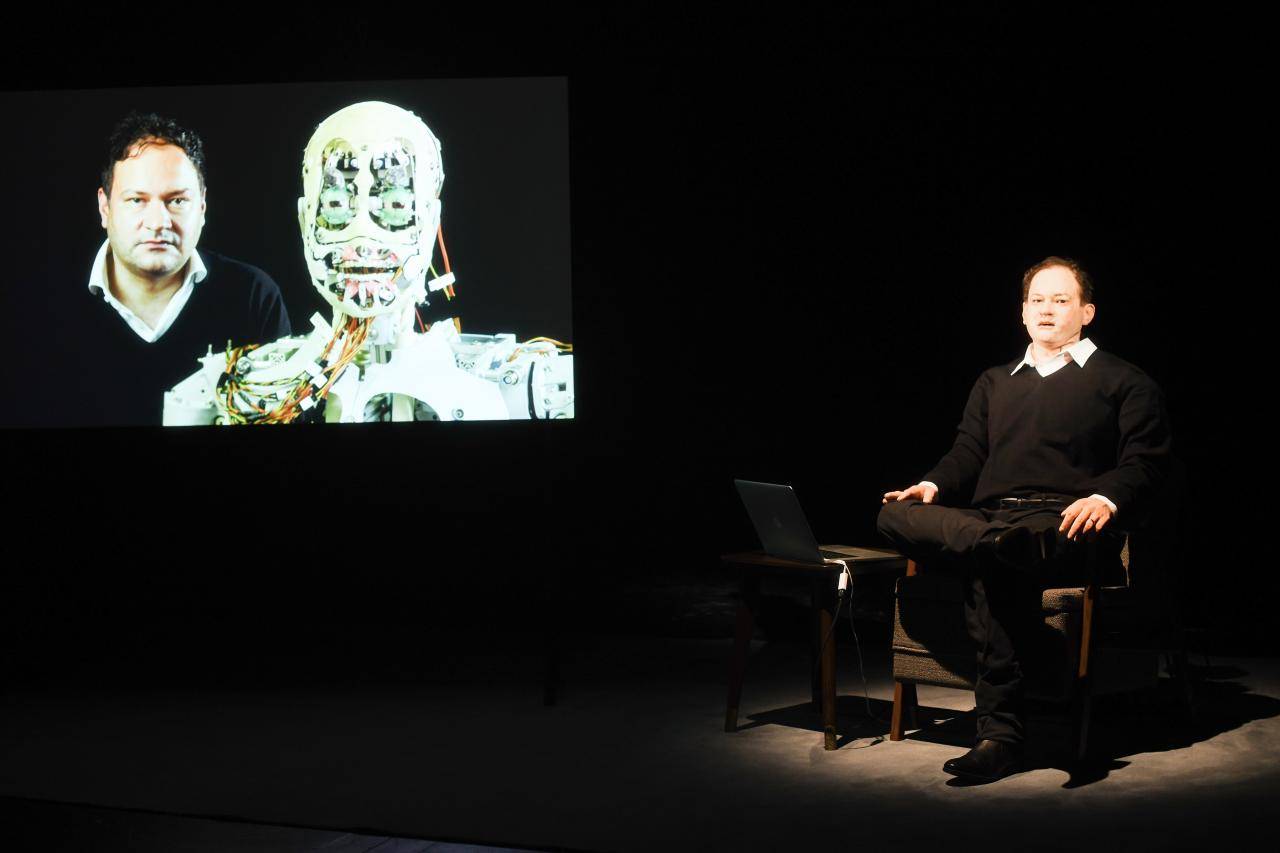
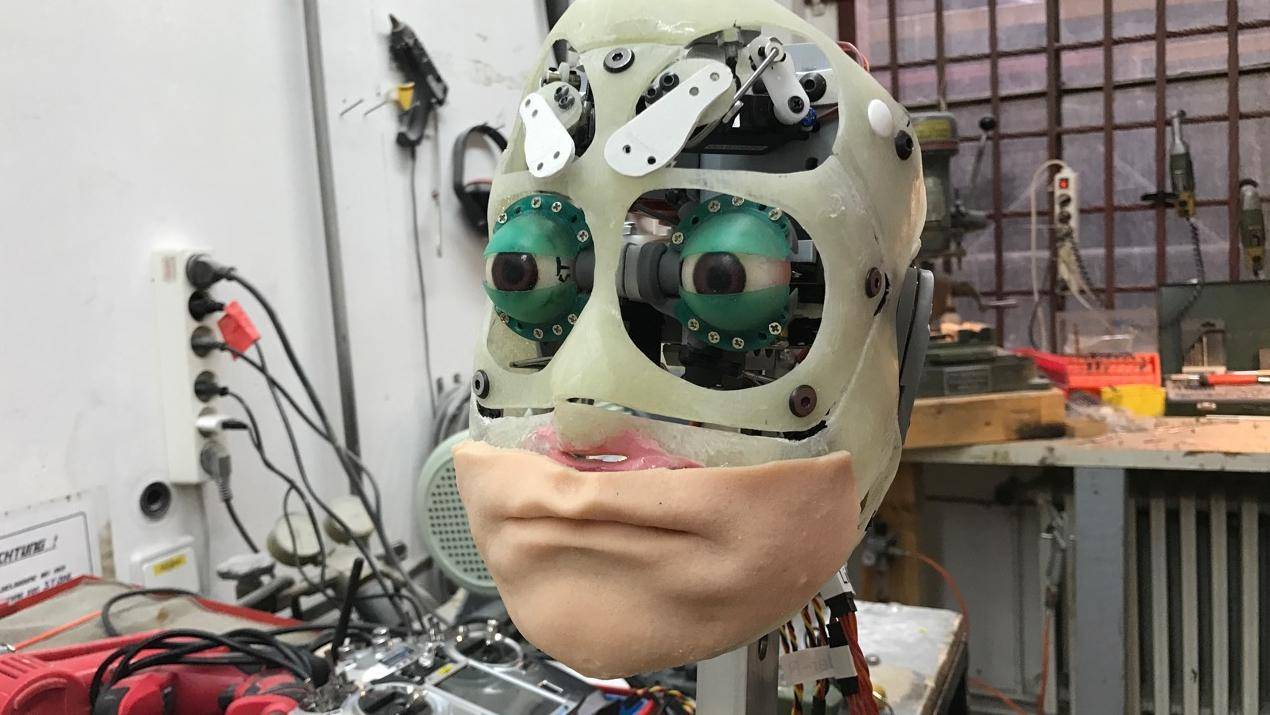
THOMAS MELLE
Thomas Melle, born in 1975, studied Comparative Literature and Philosophy in Tübingen, Austin (Texas), and Berlin. He is the author of frequently performed plays and has translated works by authors such as William T. Vollmann and Tom McCarthy into German. His collection of short stories entitled “Raumforderung” (2007) received the “Förderpreis” for emerging talent, which is awarded alongside the Bremen Literature Prize (“Bremer Literaturpreis”). His debut novel “Sickster” (2011) was nominated for the German Book Prize and was recognized with the Franz Hessel Prize. The novel “3000 Euros” followed in 2014. It was shortlisted for the German Book Prize and earned Melle the Berlin Art Prize (“Berliner Kunstpreis”) in 2015. “Die Welt im Rücken (The World at Your Back)” was published in 2016. It also made the short list for the German Book Prize and was recognized with the Klopstock Prize. Melle is the 2017/18 recipient of the “Stadtschreiber von Bergen” (Bergen writer in residence) award.
Thomas Melle, born in 1975, studied Comparative Literature and Philosophy in Tübingen, Austin (Texas), and Berlin. He is the author of frequently performed plays and has translated works by authors such as William T. Vollmann and Tom McCarthy into German. His collection of short stories entitled “Raumforderung” (2007) received the “Förderpreis” for emerging talent, which is awarded alongside the Bremen Literature Prize (“Bremer Literaturpreis”). His debut novel “Sickster” (2011) was nominated for the German Book Prize and was recognized with the Franz Hessel Prize. The novel “3000 Euros” followed in 2014. It was shortlisted for the German Book Prize and earned Melle the Berlin Art Prize (“Berliner Kunstpreis”) in 2015. “Die Welt im Rücken (The World at Your Back)” was published in 2016. It also made the short list for the German Book Prize and was recognized with the Klopstock Prize. Melle is the 2017/18 recipient of the “Stadtschreiber von Bergen” (Bergen writer in residence) award.
CAST AND CREW
Concept, Text & Direction: Stefan Kaegi
Text/Body/Voice: Thomas Melle
Equipment: Evi Bauer
Animatronic: Chiscreatures Filmeffects GmbH
Manufacturing and Art Finish of the silicone head / coloration and hair: Tommy Opatz
(2023) Manufacturing and Art Finishing of the silicone head and coloring: Ina Chochol; Hair punching: Susanna Lang; Mounting-systems and rework animatronics: Jörg Steegmüller/Steegmüller Skulpturen
Dramaturgy: Martin Valdés-Staube
Video Design: Mikko Gaestel
Musik: Nicolas Neecke
Production management Rimini Protokoll / Touring: Monica Ferrari
Light Design/Touring: Robert Läßig, Martin Schwemin, Lisa Eßwein
Sound- and Video Design/Touring: Jaromir Zezula, Nikolas Neecke, Manuela Schininá
Concept, Text & Direction: Stefan Kaegi
Text/Body/Voice: Thomas Melle
Equipment: Evi Bauer
Animatronic: Chiscreatures Filmeffects GmbH
Manufacturing and Art Finish of the silicone head / coloration and hair: Tommy Opatz
(2023) Manufacturing and Art Finishing of the silicone head and coloring: Ina Chochol; Hair punching: Susanna Lang; Mounting-systems and rework animatronics: Jörg Steegmüller/Steegmüller Skulpturen
Dramaturgy: Martin Valdés-Staube
Video Design: Mikko Gaestel
Musik: Nicolas Neecke
Production management Rimini Protokoll / Touring: Monica Ferrari
Light Design/Touring: Robert Läßig, Martin Schwemin, Lisa Eßwein
Sound- and Video Design/Touring: Jaromir Zezula, Nikolas Neecke, Manuela Schininá
This play from Rimini Protokoll has originally been produced by the Münchner Kammerspiele, in coproduction with Berliner Festspiele-Immersion, donaufestival (Krems), Feodor Elutine (Moscow), FOG Triennale Milano Performing Arts (Milano), Temporada Alta-Festival de Tador de Catalunya (Girona), SPRING Utrecht
Performing rights: Rowohlt Theater Verlag, Reinbek bei Hamburg
DIRECTOR
Stefan Kaegi creates documentary theatre plays, audio-interventions, curated formats and works in the urban environment in a diverse variety of collaborative partnerships. Using research, public auditions and conceptual processes, he often gives voice to ‘experts' who are not trained actors but have something to tell. Most of his works are released under the Rimini Protokoll label.
Stefan Kaegi creates documentary theatre plays, audio-interventions, curated formats and works in the urban environment in a diverse variety of collaborative partnerships. Using research, public auditions and conceptual processes, he often gives voice to ‘experts' who are not trained actors but have something to tell. Most of his works are released under the Rimini Protokoll label.
PRODUCTION
Helgard Haug, Stefan Kaegi and Daniel Wetzel founded the theatre-label Rimini Protokoll in 2000 and have since worked in different constellations under this name. Work by work they have expanded the means of the theatre to create new perspectives on reality.Rimini Protokoll often develop their stage-works, interventions, performative installations and audio plays together with experts who have gained their knowledge and skills beyond the theatre. Furthermore, they like to transpose rooms or social structures into theatrical formats. Many of their works feature interactivity and a playful use of technology.
Helgard Haug, Stefan Kaegi and Daniel Wetzel founded the theatre-label Rimini Protokoll in 2000 and have since worked in different constellations under this name. Work by work they have expanded the means of the theatre to create new perspectives on reality.Rimini Protokoll often develop their stage-works, interventions, performative installations and audio plays together with experts who have gained their knowledge and skills beyond the theatre. Furthermore, they like to transpose rooms or social structures into theatrical formats. Many of their works feature interactivity and a playful use of technology.
The pieces "All right. Good night." (2022), “Chinchilla Arsehole, eyeye” (2020), “Situation Rooms” (2014), “Wallenstein” (2006) and “Deadline” (2004), have been invited to the Berliner Theatertreffen. On top of that, Rimini Protokoll received the Mülheimer Dramatikerpreis for “Karl Marx: Das Kapital, Erster Band”, the German theatre award Faust, the Grand Prix Theatre from the Swiss Federal Office for Culture, the European Theatre Award, the Silver Lion at the Theatre Biennale in Venice, as well as the German Audio Play Award and the War Blinded Audio Play Prize.
Notice
Date:
Friday, 14th Mar. @ 19:30
Saturday, 15th Mar. - Sunday, 16th Mar. @ 14:00 / 16:30 / 19:30
Price: 200
Voiceover: German/Chinese/English available
Duration: 55 mins
Ticket Collection Method
Please take your tickets at the Ticket Center of the YOUNG Theater (E2 gate of the theater) before the show, enter the ticket collection code on the self-service ticket machine with the 8-digit ticket collection code in the SMS which you received, and then enter the theater after exchanging the paper ticket.
Please take your tickets at the Ticket Center of the YOUNG Theater (E2 gate of the theater) before the show, enter the ticket collection code on the self-service ticket machine with the 8-digit ticket collection code in the SMS which you received, and then enter the theater after exchanging the paper ticket.
working hours of ticket office: 10:00 - 20:00
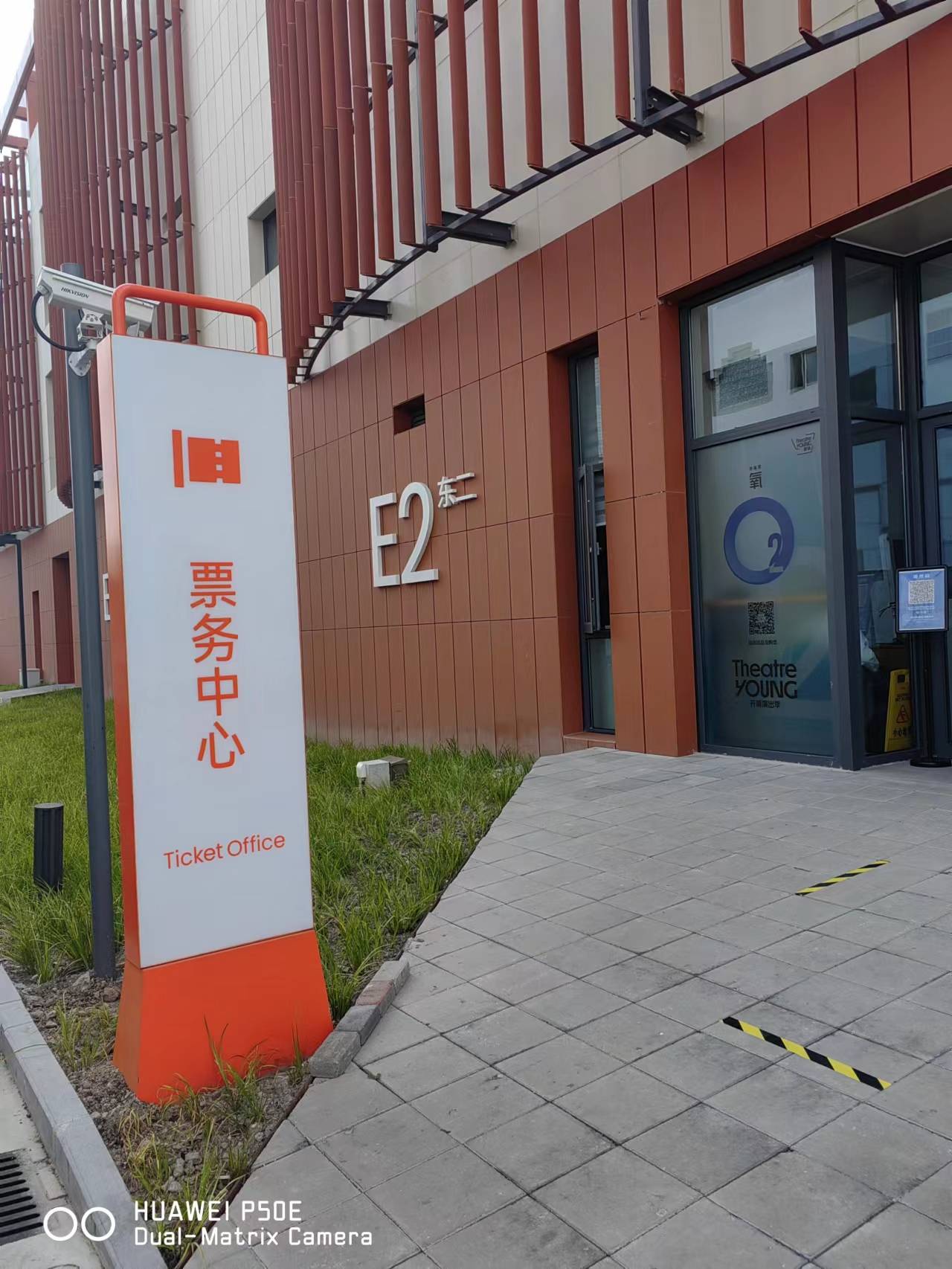
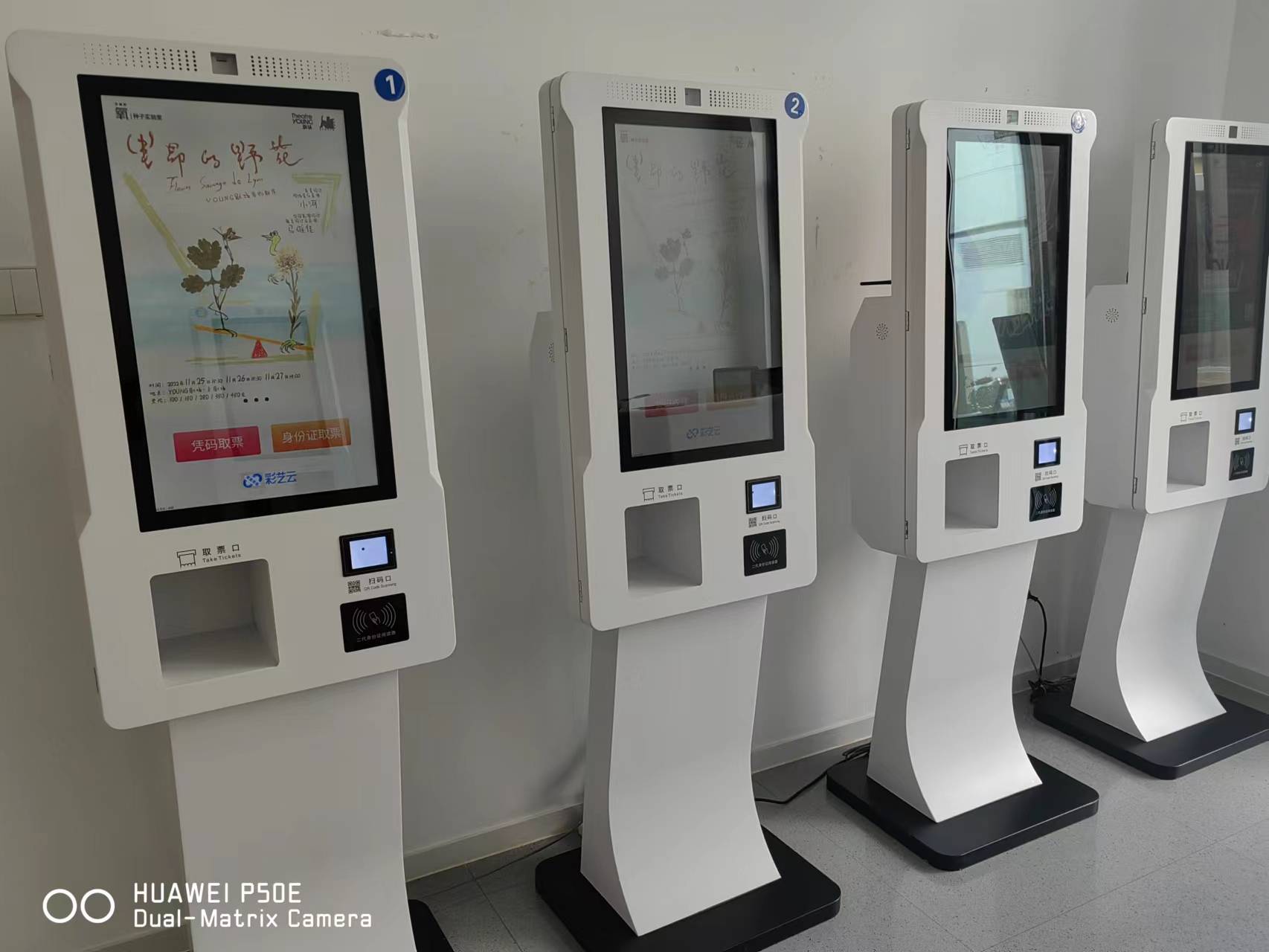
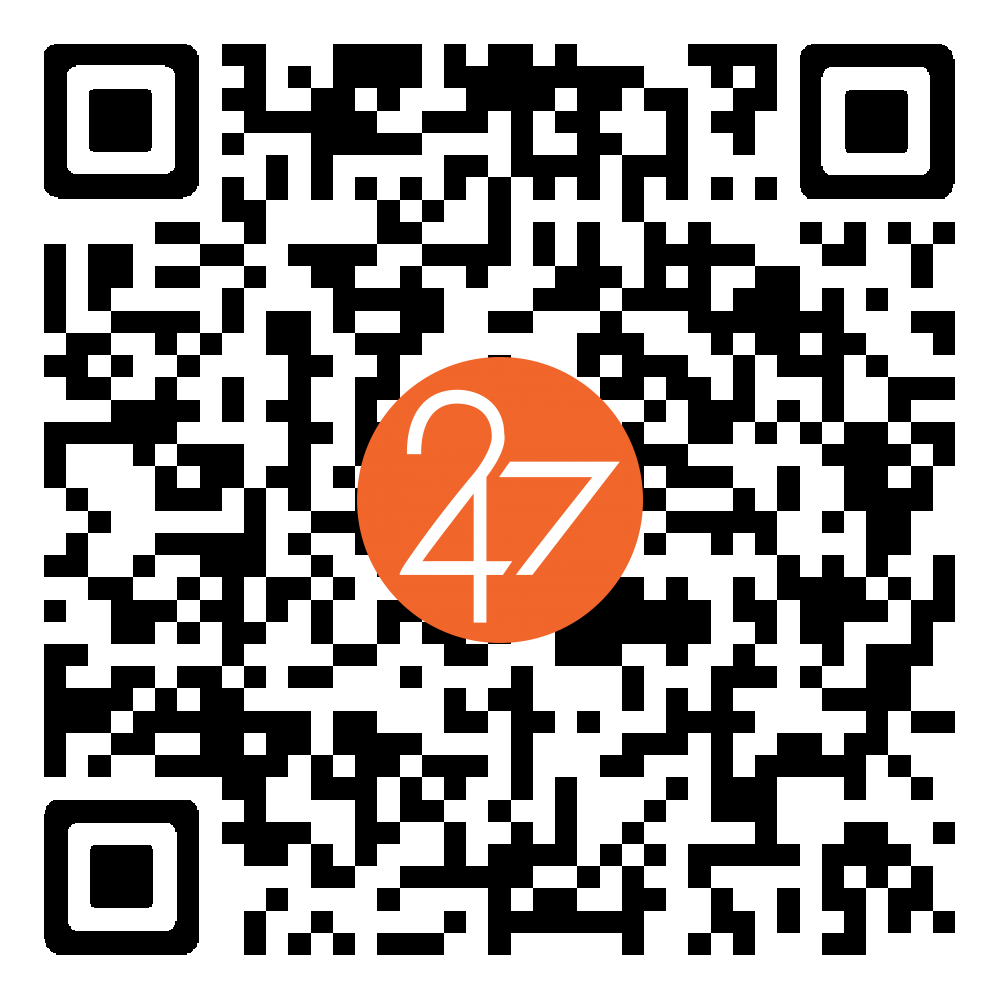
Follow our WeChat for event news, deals, gossip and more!
Book Now
Uncanny Valley By Rimini Protokoll (Stefan Kaegi) Und Thomas Melle
Venue:
Theatre YOUNG
NO.1155, Kongjiang Rd Yangpu Shanghai
Date:
3/15/2025 - 3/16/2025
Choose Session:
Choose Price:
© 247tickets 2020 沪ICP备19024898号-2

 Add us on WeChat to speak to our friendly customer service team! ID: Tickets247Tickets
Add us on WeChat to speak to our friendly customer service team! ID: Tickets247Tickets